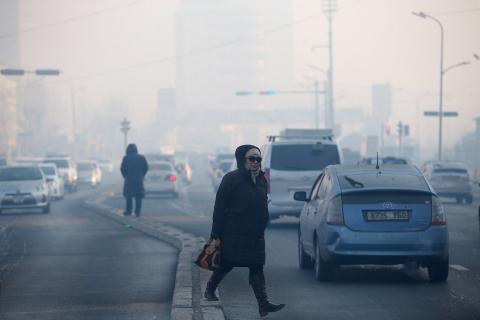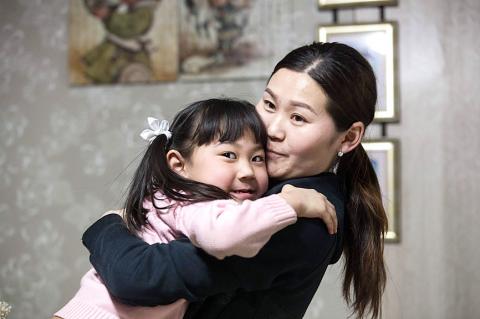In the world’s coldest capital, many burn coal and plastic just to survive temperatures as low as minus-40°C — but warmth comes at a price: Deadly pollution makes Ulaanbataar’s air too toxic for children to breathe, leaving parents little choice but to evacuate them to the countryside.
This exodus is a stark warning of the future for urban areas in much of Asia, where scenes of citizens in anti-pollution masks against a backdrop of brown skies are becoming routine, rather than apocalyptic.
Ulaanbaatar is one of the most polluted cities on the planet, alongside New Delhi, Dhaka, Kabul, and Beijing. It regularly exceeds WHO recommendations for air quality even as experts warn of disastrous consequences, particularly for children, including stunted development, chronic illness, and in some cases, death.

Photo: AFP
Erdene-Bat Naranchimeg had to watch helplessly as her daughter Amina battled illness virtually from birth, her immune system handicapped by the smog-choked air in Mongolia’s capital.
“We would constantly be in and out of the hospital,” Naranchimeg said, adding that her child contracted pneumonia twice at the age of two, requiring several rounds of antibiotics.
This is not a unique case in a city where winter temperatures plunge toward being uninhabitable, particularly in the districts that rural workers moved to in search of a better life.

Photo: AFP
Here row upon row of the traditional tents — known as gers — are warmed by coal, or any other flammable material available. The resulting thick black smoke shoots out in plumes, blanketing surrounding areas in a film of smog that makes visibility so poor it can be hard to see even a few meters ahead.
Hospitals are packed and young children are vulnerable; common colds can quickly escalate into life-threatening illness.
The situation was so bad that doctors told Naranchimeg the only solution was to send her little girl to the clean air of the countryside.
Now aged five, she lives with her grandparents in Bornuur Sum, a village 135km away from the capital, and is thriving.
“She has not been sick since she started living here,” said Naranchimeg, who makes the three-hour round trip to see her every week.
“It was very difficult in the first few months,” she said. “We used to cry when we talked on the phone.”
However, like many parents in Ulaanbaatar, she felt the move was the only way to protect her child.
The levels of PM2.5 — fine particulate matter measuring 2.5 micrometers or smaller — in Ulaanbaatar reached 3,320 in January, 133 times what the WHO considers safe.
The effects are terrible for adults, but children are even more at risk, in part because they breathe faster, taking in more air and pollutants.
As they are smaller, children are also closer to the ground, where some pollutants concentrate, and their still-developing lungs, brains and other key organs are more vulnerable to damage.
Effects to prolonged exposure range from persistent infections and asthma to slowed lung and brain development.
The risks apply in utero, too, because gases and fine particles can enter a mother’s bloodstream and placenta, causing miscarriage, birth defects and low birth weights, which can also affect a child for the rest of their lives.
Researchers are now investigating whether pollution, like exposure to tobacco smoke, has health effects that could even be passed down to the next generation.
Buyan-Ulzii Badamkhand and her husband need to stay in capital for work, but they have decided to send their two-year-old son Temuulen more than 1,000km away.
The 35-year-old mother of three struggled with the decision, even moving from one ger district to another in the hope her son’s health would improve.
However, successive bouts of illness, including bronchitis that lasted a whole year, finally convinced Badamkhand to send her son to his grandparents.
Hours after he arrived, she called her mother-in-law to discuss her son’s medicines.
“But my mother-in-law asked me: ‘Does he still need medicine? He is not coughing anymore,’” she said.
“I tell myself that it does not matter that I miss him and who raises him, as long as he is healthy, I am content,” Badamkhand said.
Respiratory problems are the most obvious effect of air pollution, but research suggests dirty air can also put children at greater risk of diabetes and cardiovascular disease later in life.
The WHO also links it to leukaemia and behavioral disorders.
When air pollution peaks in winter, Ulaanbaatar’s playgrounds empty and those who are able to are increasingly traveling abroad to wait out the smog.
In desperation, Luvsangombo Chinchuluun, a civil society activist, borrowed money to take her granddaughter to Thailand for the whole of January.
“We cannot let her play outside [in Ulaanbaatar] because of the air pollution, so we decided to leave,” she said.
The persistent smog has caused tensions in the city, with those living in wealthier areas blaming the ger residents for the pollution and even calling for the tent districts to be cleared, but the ger residents say coal is all they can afford.
“People come to the capital because they need sustainable income,” said Dorjdagva Adiyasuren, a 54-year-old mother of six.
“It’s not their fault,” she added.
In a bid to tackle the problem, the local government banned domestic migration in 2017, and a ban on burning coal comes into force from May.
However, it is unclear whether the moves will be enough to make a difference.
For Naranchimeg, the problems are serious enough to make her consider whether she wants more children.
“Now, I am terribly afraid of to give birth again. It is risky to carry a child and what will happen to the child after it is born in this amount of pollution?” she said.

Yemen’s separatist leader has vowed to keep working for an independent state in the country’s south, in his first social media post since he disappeared earlier this month after his group briefly seized swathes of territory. Aidarous al-Zubaidi’s United Arab Emirates (UAE)-backed Southern Transitional Council (STC) forces last month captured two Yemeni provinces in an offensive that was rolled back by Saudi strikes and Riyadh’s allied forces on the ground. Al-Zubaidi then disappeared after he failed to board a flight to Riyadh for talks earlier this month, with Saudi Arabia accusing him of fleeing to Abu Dhabi, while supporters insisted he was

‘SHOCK TACTIC’: The dismissal of Yang mirrors past cases such as Jang Song-thaek, Kim’s uncle, who was executed after being accused of plotting to overthrow his nephew North Korean leader Kim Jong-un has fired his vice premier, compared him to a goat and railed against “incompetent” officials, state media reported yesterday, in a rare and very public broadside against apparatchiks at the opening of a critical factory. Vice Premier Yang Sung-ho was sacked “on the spot,” the state-run Korean Central News Agency said, in a speech in which Kim attacked “irresponsible, rude and incompetent leading officials.” “Please, comrade vice premier, resign by yourself when you can do it on your own before it is too late,” Kim reportedly said. “He is ineligible for an important duty. Put simply, it was

The Chinese Embassy in Manila yesterday said it has filed a diplomatic protest against a Philippine Coast Guard spokesman over a social media post that included cartoonish images of Chinese President Xi Jinping (習近平). Philippine Coast Guard spokesman Jay Tarriela and an embassy official had been trading barbs since last week over issues concerning the disputed South China Sea. The crucial waterway, which Beijing claims historic rights to despite an international ruling that its assertion has no legal basis, has been the site of repeated clashes between Chinese and Philippine vessels. Tarriela’s Facebook post on Wednesday included a photo of him giving a

Syrian President Ahmed al-Sharaa on Sunday announced a deal with the chief of Kurdish-led forces that includes a ceasefire, after government troops advanced across Kurdish-held areas of the country’s north and east. Syrian Kurdish leader Mazloum Abdi said he had agreed to the deal to avoid a broader war. He made the decision after deadly clashes in the Syrian city of Raqa on Sunday between Kurdish-led forces and local fighters loyal to Damascus, and fighting this month between the Kurds and government forces. The agreement would also see the Kurdish administration and forces integrate into the state after months of stalled negotiations on